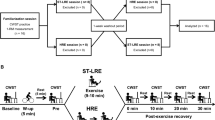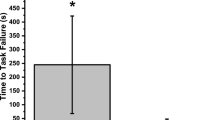Abstract
Purpose
To determine the effects of performing a self-regulated cognitive dual task on time to failure and neuromuscular force control during submaximal isometric contractions.
Methods
Fifteen young sedentary males performed isometric contractions at 50% of each individual’s maximal voluntary contraction (MVC) under single-task (without cognitive load) and dual-task (with self-regulated mathematical task) conditions. Force signal complexity and biceps brachialis muscle activity were determined at the start, middle, and end of each trial. The slope of the linear regression of median frequency determined the rate of muscle fatigue. Force-task error was established as any amplitude percentage greater or less than 50% MVC.
Results
The dual-task condition resulted in a 42 s longer time to failure than the single-task condition. EMG amplitude did not differ between conditions. The rate of muscle fatigue was higher in the single-task (− 0.35%/s) than the dual-task (− 0.2%/s) condition. Force signal complexity was, on average, 22% lower in the dual-task condition. The dual-task condition, as compared to the single-task condition, elicited a higher rate of force-task error below (6.37 versus 4.76%) and over (2.11 versus 1.68%) the force threshold.
Conclusion
The dual-task condition resulted in a longer time to failure and decreased motor output complexity and fatigue rate when performing a submaximal force task. As the dual task also increased the force-task error, we suggest cognitive dual tasks as a possible strategy for delaying fatigue in sedentary young males when exerting submaximal isometric force, contributing to neuromuscular training when error in force control can be ignored.


Similar content being viewed by others
Abbreviations
- CI:
-
Coefficient interval
- sEMG:
-
Surface electromyography
- MDF:
-
Median frequency
- MVC:
-
Maximal voluntary contraction
- RMS:
-
Root mean square
- SampEn:
-
Sample entropy
References
Aleksandrov AA, Knyazeva VM (2017) Effects of cognitive loading on the development of muscle fatigue. Neurosci Behav Physiol 47(8):960–966. https://doi.org/10.1007/s11055-017-0497-9
Athreya DN, Van Orden G, Riley MA (2012) Feedback about isometric force production yields more random variations. Neurosci Lett 513(1):37–41. https://doi.org/10.1016/j.neulet.2012.02.002
Bachasson D, Decorte N, Wuyam B, Millet GY, Verges S (2016) Original research: central and peripheral quadriceps fatigue in young and middle-aged untrained and endurance-trained men: a comparative study. Exp Biol Med (Maywood) 241(16):1844–1852. https://doi.org/10.1177/1535370216654225
Bigliassi M, Silva VB, Karageorghis CI, Bird JM, Santos PC, Altimari LR (2016) Brain mechanisms that underlie the effects of motivational audiovisual stimuli on psychophysiological responses during exercise. Physiol Behav 158:128–136. https://doi.org/10.1016/j.physbeh.2016.03.001
Calatayud J, Vinstrup J, Jakobsen MD, Sundstrup E, Colado JC, Andersen LL (2017) Mind-muscle connection training principle: influence of muscle strength and training experience during a pushing movement. Eur J Appl Physiol 117(7):1445–1452. https://doi.org/10.1007/s00421-017-3637-6
Chow EC, Etnier JL (2017) Effects of music and video on perceived exertion during high-intensity exercise. J Sport Health Sci 6(1):81–88. https://doi.org/10.1016/j.jshs.2015.12.007
Cifrek M, Medved V, Tonković S, Ostojić S (2009) Surface EMG based muscle fatigue evaluation in biomechanics. Clin Biomech 24(4):327–340
Deeney C, O’Sullivan L (2017) Effects of cognitive loading and force on upper trapezius fatigue. Occup Med 67(9):678–683
Enoka RM, Duchateau J (2008) Muscle fatigue: what, why and how it influences muscle function. J Physiol 586(1):11–23
Evstigneeva M, Aleksandrov A, Mathiassen SE, Lyskov E (2012) Concurrent cognitive task may improve motor work performance and reduce muscle fatigue. Work 41(Suppl 1):2893–2896. https://doi.org/10.3233/WOR-2012-0540-2893
Gandevia SC (2001) Spinal and supraspinal factors in human muscle fatigue. Physiol Rev 81(4):1725–1789
Gibson ASC, Baden DA, Lambert MI, Lambert EV, Harley YX, Hampson D, Russell VA, Noakes TD (2003) The conscious perception of the sensation of fatigue. Sports Med 33(3):167–176
Hermens HJ, Freriks B, Merletti R, Stegeman D, Blok J, Rau G, Disselhorst-Klug C, Hägg G (1999) European recommendations for surface electromyography. Roessingh Res Dev 8(2):13–54
Kuznetsov NA, Riley MA (2010) Spatial resolution of visual feedback affects variability and structure of isometric force. Neurosci Lett 470(2):121–125. https://doi.org/10.1016/j.neulet.2009.12.068
Lee Hong S, Newell KM (2008) Visual information gain and the regulation of constant force levels. Exp Brain Res 189(1):61–69. https://doi.org/10.1007/s00221-008-1403-z
Lee Hong S, Brown AJ, Newell KM (2008) Compensatory properties of visual information in the control of isometric force. Percepti Psychophys 70(2):306–313. https://doi.org/10.3758/pp.70.2.306
Li K, Marquardt TL, Li ZM (2013) Removal of visual feedback lowers structural variability of inter-digit force coordination during sustained precision pinch. Neurosci Lett 545:1–5. https://doi.org/10.1016/j.neulet.2013.04.011
Lohse KR, Sherwood DE (2011) Defining the focus of attention: effects of attention on perceived exertion and fatigue. Front Psychol 2:332. https://doi.org/10.3389/fpsyg.2011.00332
Lohse KR, Sherwood DE (2012) Thinking about muscles: the neuromuscular effects of attentional focus on accuracy and fatigue. Acta Psychol (Amst) 140(3):236–245. https://doi.org/10.1016/j.actpsy.2012.05.009
Marchant DC (2010) Attentional focusing instructions and force production. Front Psychol 1:210. https://doi.org/10.3389/fpsyg.2010.00210
Marchant DC, Greig M, Bullough J, Hitchen D (2011) Instructions to adopt an external focus enhance muscular endurance. Res Q Exerc Sport 82(3):466–473
McNevin NH, Wulf G, Carlson C (2000) Effects of attentional focus, self-control, and dyad training on motor learning: implications for physical rehabilitation. Phys Therapy 80(4):373–385
Mehta RK, Agnew MJ (2012) Influence of mental workload on muscle endurance, fatigue, and recovery during intermittent static work. Eur J Appl Physiol 112(8):2891–2902. https://doi.org/10.1007/s00421-011-2264-x
Mehta RK, Parasuraman R (2014) Effects of mental fatigue on the development of physical fatigue: a neuroergonomic approach. Hum Factors 56(4):645–656. https://doi.org/10.1177/0018720813507279
Novak T, Newell KM (2017) Physiological tremor (8–12Hz component) in isometric force control. Neurosci Lett 641:87–93. https://doi.org/10.1016/j.neulet.2017.01.034
Pereira HM, Spears VC, Schlinder-Delap B, Yoon T, Harkins A, Nielson KA, Hoeger Bement M, Hunter SK (2015a) Sex differences in arm muscle fatigability with cognitive demand in older adults. Clin Orthop Relat Res 473(8):2568–2577. https://doi.org/10.1007/s11999-015-4205-1
Pereira HM, Spears VC, Schlinder-Delap B, Yoon T, Nielson KA, Hunter SK (2015b) Age and sex differences in steadiness of elbow flexor muscles with imposed cognitive demand. Eur J Appl Physiol 115(6):1367–1379. https://doi.org/10.1007/s00421-015-3113-0
Pethick J, Winter SL, Burnley M (2015) Fatigue reduces the complexity of knee extensor torque fluctuations during maximal and submaximal intermittent isometric contractions in man. J Physiol 593(8):2085–2096. https://doi.org/10.1113/jphysiol.2015.284380
Pethick J, Winter SL, Burnley M (2016) Loss of knee extensor torque complexity during fatiguing isometric muscle contractions occurs exclusively above the critical torque. Am J Physiol Regul Integr Comp Physiol 310(11):R1144–R1153. https://doi.org/10.1152/ajpregu.00019.2016
Prodoehl J, Vaillancourt DE (2010) Effects of visual gain on force control at the elbow and ankle. Exp Brain Res 200(1):67–79. https://doi.org/10.1007/s00221-009-1966-3
Richman JS, Moorman JR (2000) Physiological time-series analysis using approximate entropy and sample entropy. Am J Physiol Heart Circ Physiol 278(6):H2039-H2049
Srinivasan R, Lungren M, Langenderfer J, Hughes R (2007) Fiber type composition and maximum shortening velocity of muscles crossing the human shoulder. Clin Anat 20(2):144–149
Suda EY, Madeleine P, Hirata RP, Samani A, Kawamura TT, Sacco IC (2017) Reduced complexity of force and muscle activity during low level isometric contractions of the ankle in diabetic individuals. Clin Biomech (Bristol Avon) 42:38–46. https://doi.org/10.1016/j.clinbiomech.2017.01.001
Tod D, Edwards C, McGuigan M, Lovell G (2015) A systematic review of the effect of cognitive strategies on strength performance. Sports Med 45(11):1589–1602. https://doi.org/10.1007/s40279-015-0356-1
Van Cutsem J, Marcora S, De Pauw K, Bailey S, Meeusen R, Roelands B (2017) The effects of mental fatigue on physical performance: a systematic review. Sports Med 47(8):1569–1588
Westerblad H, Bruton JD, Katz A (2010) Skeletal muscle: energy metabolism, fiber types, fatigue and adaptability. Exp Cell Res 316(18):3093–3099
Wulf G, Shea C, Park JH (2001) Attention and motor performance: preferences for and advantages of an external focus. Res Q Exerc Sport 72(4):335–344. https://doi.org/10.1080/02701367.2001.10608970
Wulf G, Dufek JS, Lozano L, Pettigrew C (2010) Increased jump height and reduced EMG activity with an external focus. Hum Mov Sci 29(3):440–448. https://doi.org/10.1016/j.humov.2009.11.008
Yang Q, Fang Y, Sun CK, Siemionow V, Ranganathan VK, Khoshknabi D, Davis MP, Walsh D, Sahgal V, Yue GH (2009) Weakening of functional corticomuscular coupling during muscle fatigue. Brain Res 1250:101–112. https://doi.org/10.1016/j.brainres.2008.10.074
Yao W, Fuglevand RJ, Enoka RM (2000) Motor-unit synchronization increases EMG amplitude and decreases force steadiness of simulated contractions. J Neurophysiol 83(1):441–452
Yoon T, Keller ML, De-Lap BS, Harkins A, Lepers R, Hunter SK (2009) Sex differences in response to cognitive stress during a fatiguing contraction. J Appl Physiol (1985) 107(5):1486–1496. https://doi.org/10.1152/japplphysiol.00238.2009
Zachry T, Wulf G, Mercer J, Bezodis N (2005) Increased movement accuracy and reduced EMG activity as the result of adopting an external focus of attention. Brain Res Bull 67(4):304–309. https://doi.org/10.1016/j.brainresbull.2005.06.035
Acknowledgements
FPC is supported by CNPq. The authors would like to thank Priscila Escobar Gimpel for creating the illustration of the experimental setup.
Author information
Authors and Affiliations
Contributions
CCM, CI, CB and BM conceived and designed research. CI, CB and BM conducted experiments. CCM, JC and FPC contributed new reagents or analytical tools. CCM JQ analyzed data. CCM, JC, CI, CB, BM, VER, and FPC wrote the manuscript. All authors read and approved the manuscript
Corresponding author
Ethics declarations
Conflict of interest
CCM, JC, CI, CB, BM, VER, and FPC have nothing to declare.
Ethical approval
All procedures performed in studies involving human participants were in accordance with the ethical standards of the institutional and/or national research committee and with the 1964 Helsinki declaration and its later amendments or comparable ethical standards.
Informed consent
All volunteers gave written informed consent.
Additional information
Communicated by Toshio Moritani.
Rights and permissions
About this article
Cite this article
Cruz-Montecinos, C., Calatayud, J., Iturriaga, C. et al. Influence of a self-regulated cognitive dual task on time to failure and complexity of submaximal isometric force control. Eur J Appl Physiol 118, 2021–2027 (2018). https://doi.org/10.1007/s00421-018-3936-6
Received:
Accepted:
Published:
Issue Date:
DOI: https://doi.org/10.1007/s00421-018-3936-6




